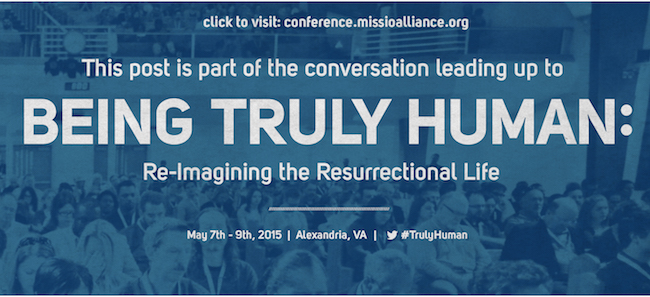Why I Would Be Going to #TrulyHuman – Even If I Didn’t Have To (Part 1)
It seems like there is a new conference for church leaders coming onto the scene almost every week.
In fact, there are so many, it’s really hard to keep up. Some are big, some are small, some are practical, some are academic. If you are looking for your conference buffet item of choice today, you can certainly find it. Indeed, even in the weeks around this year’s Missio Alliance event, there are several significant conferences to choose from. One will focus on the important practice of church multiplication. Another will focus on a topic incredibly similar to the one at Missio Alliance, but more than likely from an incredibly different perspective. (I know this because one of the reasons this group is having this conference is to counter the influence of NT Wright. My guess is that most people engaging with Missio Alliance are incredibly helped by NT Wright.)
No doubt, there are probably others I am not aware of.
I spend a great deal of my life attending conference type events. I go to so many, I wouldn’t generally choose to go to another if I didn’t have to. But I WOULD choose to be at Missio’s gathering this year. Here’s why.
1. While conversations regarding the practice of church in our day are so important, in my work and observation of churches, these types of best-practice conversations and training are often of secondary significance.
For instance, let’s take the topic of church multiplication. Most agree that church multiplication is important and would like to participate in that work in some way. The challenges of moving along the process are really what hinder most churches in getting to the point of multiplication and the challenges of genuinely engaging unreached people toward a dynamic Christian faith are what hinder a new congregation as it begins. Both of those issues are what need more significant attention if we are to see church multiplication happen more regularly.
Usually the first is a deficit in an individual or congregational understanding of the compelling and life-dictating story of the Resurrected Christ of which they are a part. Usually the second is that most Christians are unable to hold internally (must less communicate) both a coherent and compelling articulation of the significance of the Christian faith amidst the major cultural challenges of our day.
It is not normally the situation that people of faith are disconnected from non-Christian or un-churched people, it is normally that they lack the confidence and manner for how to relate their life and faith when facing the challenges of human sexuality, religious pluralism, the rise of the “nones” which marks an increasing skepticism in our culture, the church’s role in addressing the racial tensions of our day, etc. THESE ARE THE MAIN ISSUES that need space for consideration. If we can make head-way on these, without capitulating to our culture, but simultaneously offering a different vision than we have done hereto, then we will not find it so hard for churches to multiply or new works to make progress.
2. I want to be in a place where break-through conversations are taking place with people who are having these break-through conversations.
This is what is needed today within the church. We need more than just a re-articulation of the faith from the 16th century. We need break-through work in the theology, philosophy, and practice of mission in our day. There will be people working this angle at this gathering.
And tomorrow we'll explore some examples of this – so stay tuned!




